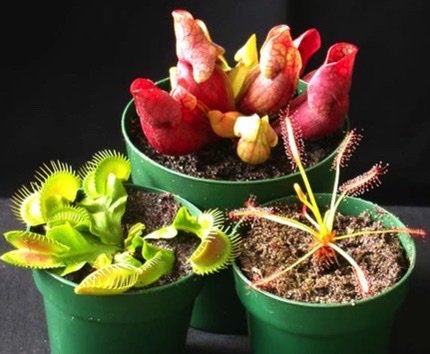
PLANT CARE
A majority of succulents and cacti (which are a subgroup of succulents), are plants that have adapted to dry environments by developing leaves, stems and roots that sotre water. They don’t mind the lack of humidity inbside our hojmes, however most require very bright ambient light along with some direct light. They like their soil to dry out entirely between watering, and in the winter require even less water than in the summer. There are some succulents (Christmas Cactus being the most common), that grow in tropical jungles and therefore have different care requirement than desert succulents described above.
SUCCULENTS & CACTI
The simplest way to determine whether a terrarium needs water is to observe the color of the soil that the clear glass vessel allows you to see. TF terrariums do not want the soil to go entirely dry. Alternatively, desert terrariums prefer to go entirely dry. Most terrariums have a decorative layer covering the soil surface, therefore they dry out slower than a potted plant. Fully enclosed terrariums will dry out even slower & need regular venting of their lid to prevent mold from growing. Ambient light is best for terrariums.
TERRARIUMS
AIR PLANTS
Tillandsia, aka Air Plants (AP) like bright, indirect light although, the larger the leaves, the less light they require. AP’s love humidity, so a bright bathroom or kitchen is often a great location for them. For additional humidity, you can mist AP’s twice a week to once a day. Many people soak AP’s in water, the smaller leaved plants with greater frequency than the large leaved ones. The key is to soak them upside down and allow them to fully
dry upside down before setting them back upright to prevent them from rotting at their crown.
AFRICAN VIOLETS
African Violets are sensitive to having water sit on their leaves and are susceptible to crown rot. Therefore it is wise to bottom water these plants. They grow best with bright indirect light or some direct morning light. They benefit from regular fertilization, soil that is neither too wet or completely dry and tend to rebloom best when kept in small pots.
Most tropical foliage (TF) plants that are grown as houseplants grow naturally as understory plants in the wild, shaded by overhead trees. Therefore most of these plants do not require direct light, only ambient light. TF plants have a wide range of preference and tolerance to their soil drying out between waterings. When in doubt, do not let a TF plant dry out completely between waterings.
TROPICAL FOLIAGE PLANTS
The plants we use on our cork bark mounts are plants that naturally grow on the trunks of trees rather than beneath soil. Our recommendation is to water a mounted plant every 7 days by removing it from the wall and placing it in a sink. Spray the moss gently to rehydrate using the shower setting on your faucet. Follow up with two deeper soakings of water then hydrate the soil and roots of the plant beneath the moss layer.
MOUNTED PLANTS
ORCHIDS
Orchids are not as tricky to care for as you might think! They appreciate bright, indirect light and if anything, prefer to be under watered rather than overwatered. Thoroughly soak the rootball once a week, making sure there is no standing water remaining in their pot. Fertilize frequently- every 3 times you water, then flushing (no fertilizer) the 4th time. Cut the flowering stem back when it’s done blooming. We recommend a loose & chunky orchid mix because they need air pockets around their roots.
CARNIVOROUS PLANTS
Most species of Carnivorous Plants (CP) are native to bogs therefore they prefer to always sit in water. They are also sensitive to excessive salts and minerals in water, and require very bright light. CP’s native to tropical areas like to stay consistently wet but do not need to sit in water. We have found tropical CP’s to also be sensitive to salts and minerals and to require very bright light. CP’s get their nutrients from the bugs they eat, so no additional fertilizer is necessary. Many CP’s like to be cold in the winter, therefore a windowsill can be a great location to grow them.
HAVE A QUESTION?
Send us an email at botanyhouseplantshop@gmail.com
Or give us a call at 970-340-4528









